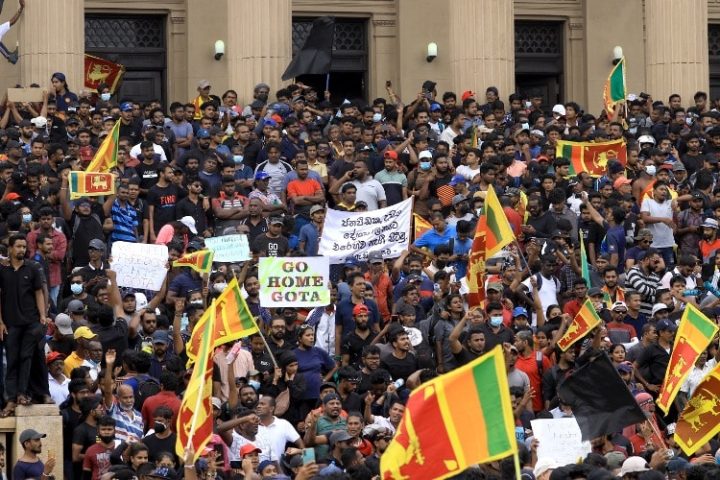
Sri Lanka, the tiny island nation off the southern tip of India, is in full crisis mode. Angry citizens, protesting severe inflation along with fuel, food, and medication shortages have overtaken several political leaders’ homes, including the official residences of the president and the prime minister. Protests over government policies that have brought hunger and deprivation began in March but boiled over last weekend when protesters breached the homes of government officials.
In May, several of the world’s biggest lenders confirmed that Sri Lanka had defaulted on close to $78 billion in foreign debts. The government asked for a restructure of loans.
President Gotabaya Rajapaksa and Prime Minister Ranil Wickremesinghe have both promised to resign over the crisis, which is quickly spiraling out of control amid 50-percent-plus inflation and shortages of fuel, food, and medication. Rolling blackouts have become common throughout the nation as the fragile energy grid struggles to keep up with demand.
Earlier on Tuesday, Rajapaksa, along with his wife and brother, attempted to leave the nation, only to be thwarted by protesters and airport immigration officers who refused to go into a VIP area to stamp his passport. Rajapaska and his wife ended up staying at a nearby military base.
Not surprisingly, Sri Lanka currently has one of the highest ESG (environment, social, and corporate governance) scores in the world at 96. By way of comparison, Sweden currently holds a score of 96, while the United States trails far behind with a score of just 51.
Global elites have sold the Sri Lankan government on the same lie that the Netherlands and, now apparently Canada, have told their citizens: namely, that all synthetic fertilizers are bad for the environment and that all farming going forward needs to be strictly organic.
Globalists convinced Rajapaksa to ban all chemical fertilizers in April of 2021. The organic fertilizer failed to yield good results when it came to the country’s staple food products.
The ban was eventually rolled back after widespread protests, but very little of the chemical fertilizer ever made it to the agricultural industry of the nation. And now Sri Lankans are faced with a serious food shortage in addition to fuel and medication shortages.
The situation with fertilizer was bad even before Russia and Ukraine went to war. The war has slowed Russian exports of fertilizer and both countries were suppliers of grain for the nation.
“We are a tropical country full of rice paddies and banana plantations, but because of this stupid fertilizer ban, now we don’t even have enough food to feed ourselves,” said Rajith Keerthi Tennakoon, the former Governor of Uva, Southern, and Central Provinces. “We have had past economic crises, security crises, but never in Sri Lanka’s history have we had a food crisis.”
According to Michael Shellenberger, an authority on climate-change politics, the Sri Lankan leaders “fell under the spell of Western green elites peddling organic agriculture and ‘ESG.’”
And now, a nation that was completely self-sufficient in food production until 2021 cannot produce enough food to feed its population.
Shellenberger, who ran for governor in California in 2018 as a Democrat, linked the situation in the Netherlands to the anarchy in Sri Lanka.
In late June, the government issued a ban on the sale of gasoline and diesel fuel for all but essential purposes. That ban has since been lifted, but fuel is still incredibly hard to come by with lines reportedly stretching for miles.
“The uprisings in Sri Lanka & Netherlands seem unrelated but they’re both reactions to governing green elites trying to destroy modern farming by restricting fertilizer use. Farmer resistance is appropriate and merits our solidarity,” Shellenberger tweeted.
Coming out of the pandemic, Sri Lanka was one of many nations hoping that the return of tourism would bring back some normalcy. Unfortunately, two of the nation’s top three markets for tourism were Russia and Ukraine. Needless to say, because of the hot war being waged by the two nations, those tourism numbers are way down.
Besides, who wants to visit a nation with no food, no gasoline, little available medicine, and frequent rolling blackouts?
Globalists have been pushing the concept of “environmentally friendly social justice governance” for a while now. Sri Lanka and the Netherlands are two examples of governments that have wholeheartedly embraced the concept.
Perhaps the chaos in these two nations are simply aberrations — or, perhaps, such chaos is occurring by design.




